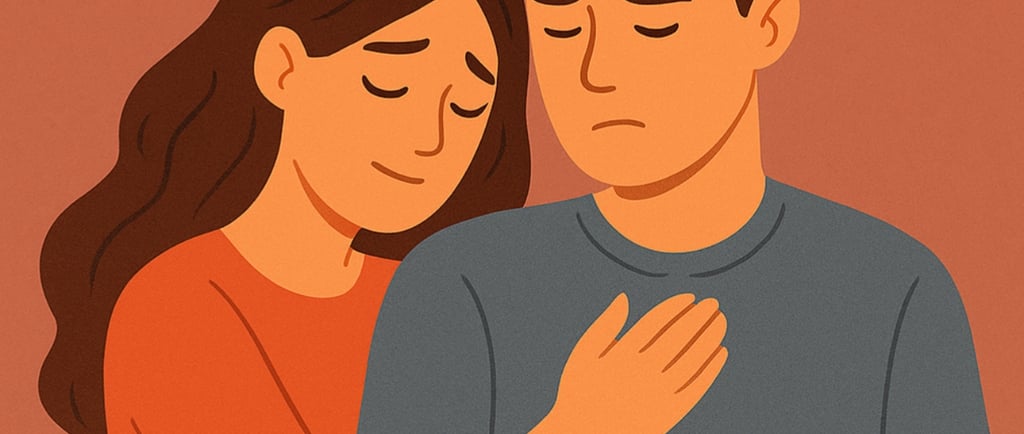Welcome
Why Does Gender-Based Discrimination Exist?
10/28/2025


There are deeply rooted double standards in our society especially when it comes to sexual desires and emotional needs. From childhood, boys and girls are viewed through completely different lenses.
In today’s world, girls are being encouraged to express their curiosity, understand their emotions, and explore closeness in relationships. But boys are not given the same freedom. When a boy desires the same emotional or intimate connection, society quickly labels him as “lustful,” “sex-obsessed,” or “characterless.” This is not only a social prejudice but also a fundamental misunderstanding of human nature.
Boys’ desires are often reduced to mere physical needs, while in reality, their hearts also carry emotional depth and psychological longing. As a result, an entire generation of boys grows up suppressing their feelings, burdened by misunderstanding, and quietly breaking from within.
From a young age, boys are taught to be strong, not to show emotions, and to always act responsibly. While these lessons aim to build resilience, they often teach boys to deny their emotional side. When society dismisses their natural desires as “just physical,” an inner conflict begins to form within them.
They crave love, affection, and closeness but fear being misunderstood. This fear turns them emotionally cold, unsatisfied, and lonely. The consequences of this double standard are profound. Boys who suppress their emotions often carry guilt and shame, believing their feelings are “wrong” or “inappropriate.”
Over time, this emotional repression leads to loneliness, anxiety, and a loss of self-esteem. Sometimes, all they need is a simple hug, a caring touch, or an honest emotional conversation but society refuses to understand these subtleties. When boys seek affection, they are called “weak” or “driven by lust,” when in truth, it’s simply an expression of their humanity.
A few real examples make this clearer:
Ravi, a 22-year-old college student, longs for emotional closeness with his partner. When he talks about wanting a hug or expressing affection, people assume he’s only after physical pleasure. But his intentions are purely emotional.
Similarly, Anil, a 25-year-old professional, wants to express love openly, but societal judgment forces him to bottle up his emotions. Over time, this silence exhausts him from within. The truth is boys’ desires also stem from emotional and psychological needs. They too want love, acceptance, and belonging.
Their sexual desire is not limited to physical attraction; it is deeply connected to intimacy and peace of mind. When this emotional aspect remains unfulfilled, an emptiness and restlessness take root. Physical relationships alone cannot fill that void and this incompleteness becomes a permanent part of their lives.
These double standards are the result of history, culture, and lack of emotional education. For centuries, patriarchal thinking has portrayed men as “aggressive, lustful, and controlling,” while women were seen as “pure and restrained.” Even today, this mindset is changing slowly.
Boys are still taught not to “talk about feelings,” fearing they’ll be seen as “weak.” But the truth is, hiding emotions doesn’t make one strong it causes inner pain. This misunderstanding also damages relationships. When men fear expressing their true feelings, emotional distance grows. Even a small gesture of affection is often misinterpreted, eroding trust and intimacy until relationships turn hollow and formal.
To change this, transformation is needed at multiple levels. First, we must understand that emotional and sexual needs are universal not gender-specific. Boys too deserve the right to share their feelings without fear or judgment. Families, schools, and society must create environments where emotional literacy is valued as much as intelligence.
Communication and empathy are essential in relationships. Both partners must understand that the desire for closeness isn’t only physical it’s also emotional. When boys can express their hearts freely, they become mentally lighter and more honest in relationships.
At the same time, media and education should teach that men are not just “driven by lust” they are equally capable of deep sensitivity and love. Society must accept that love and affection are human needs, not gender privileges.
The mental health system also needs to address this seriously. Boys who suppress emotions should have access to counseling, therapy, and safe spaces for open conversation. They must learn that seeking help is not weakness it is a sign of self-respect.
Ultimately, this double standard is a product of flawed social structures and thinking. Love, desire, and emotion are fundamental human needs gender cannot define which feeling is “right” or “wrong.”
If we truly want equality, boys too must receive the same respect and understanding that girls do. Only when society allows boys to be honest with their emotions will they be able to build genuine relationships and stay mentally healthy. Empathy, understanding, and open dialogue are the only paths to a balanced and compassionate society one where love and intimacy are not judged, but celebrated.